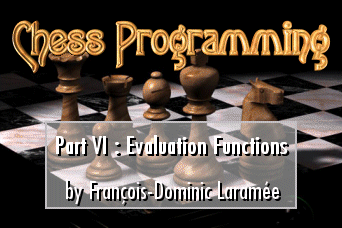11/10 - 11/12 @ Montréal, Canada
12/5 - 12/7 @ Shanghai, China
12/24 - 12/27
2/28 - 3/4 @ San Francisco, CA
More events...
2406 articles in the reference section.
Help us fight cancer!
Join SETI Team GDNet!

|
It's been six months, and I know sometimes it must have felt like I would never shut up, but here we are: the sixth and last installment of my chess programming series. Better yet: my Java chess program, primitive though it may be, is now complete, and I shipped it to Gamedev along with this, which proves that I know (a little bit of) what I've been talking about. This month's topic, the evaluation function, is unique in a very real sense: while search techniques are pretty much universal and move generation can be deducted from a game's rules and no more, evaluation requires a deep and thorough analysis of strategy. As you can well imagine, it is impossible to assess a position's relative strengths if we don't know what features are likely to lead to victory for one player or the other. Therefore, many of the concepts discussed here may apply to other games in very different fashion, or not at all; it is your job as programmer to know your game and decide what the evaluator should take into consideration. Without further delay, let us take a look at some board evaluation metrics and at how they can be used to evaluate a chess position.
|
|
|
|
|